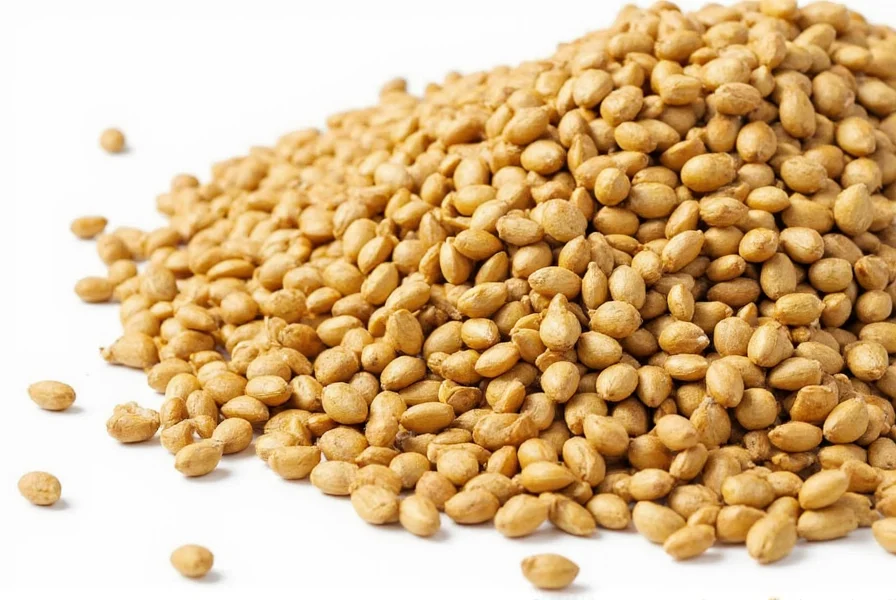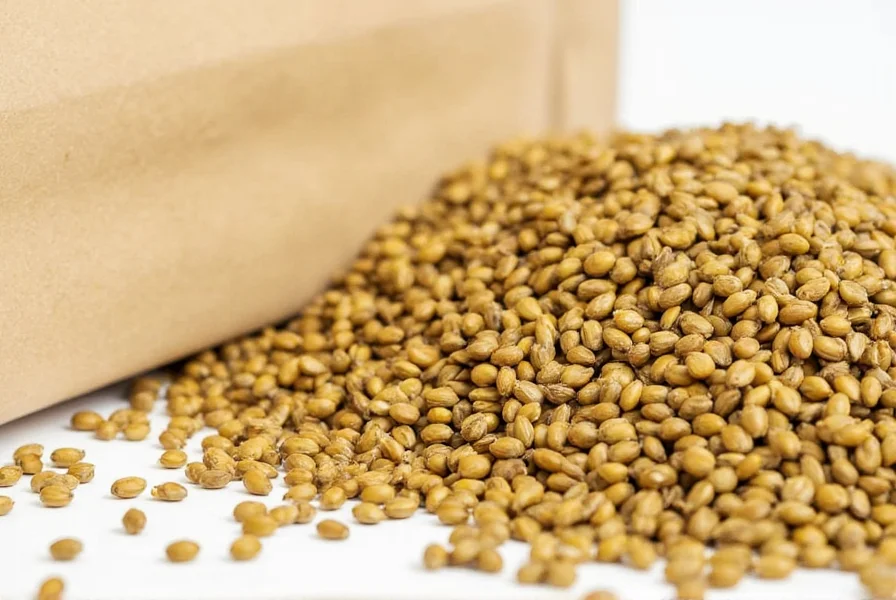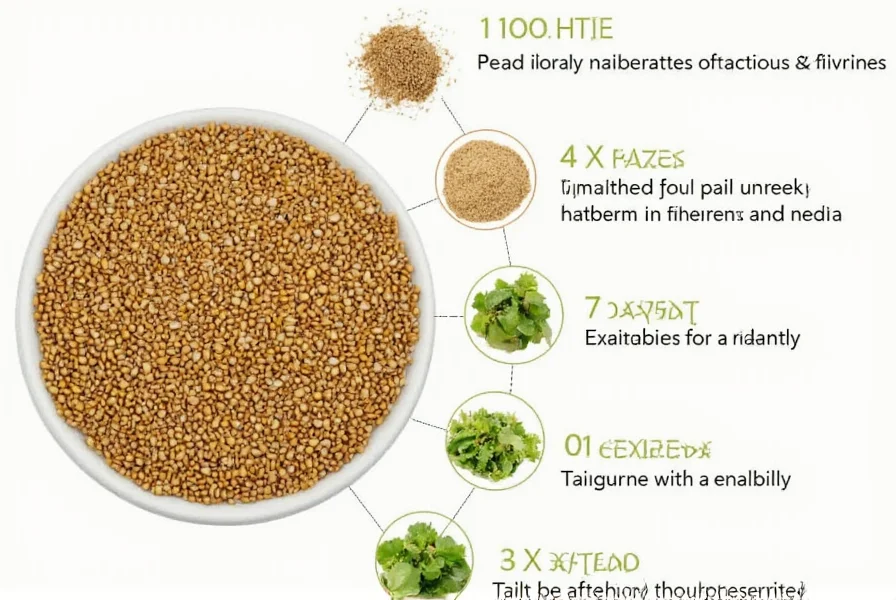Fenugreek (Trigonella foenum-graecum) has been valued across cultures for centuries, and modern science continues to validate many of its traditional uses. This versatile herb offers a unique combination of nutritional and therapeutic properties that make it stand out among natural remedies. Let's explore the evidence-based goodness of fenugreek with a balanced perspective on its benefits and appropriate usage.
Nutritional Powerhouse: Fenugreek's Composition
Fenugreek seeds contain a remarkable array of beneficial compounds that contribute to their health-promoting properties. The seeds are particularly rich in soluble fiber, which plays a crucial role in many of fenugreek's health benefits. They also contain unique phytochemicals that have been the subject of extensive research.
| Nutrient | Amount per 100g | Key Health Relevance |
|---|---|---|
| Dietary Fiber | 24.6g | Supports digestion and blood sugar regulation |
| Protein | 23g | Contains all essential amino acids |
| Iron | 33.5mg | Supports healthy blood cell production |
| Magnesium | 191mg | Essential for metabolic processes |
| 4-Hydroxyisoleucine | Varies | Key compound for blood sugar regulation |
Science-Backed Health Benefits of Fenugreek
Multiple clinical studies have investigated fenugreek's therapeutic potential, revealing several evidence-supported benefits that constitute the true goodness of fenugreek.
Blood Sugar Regulation
One of the most well-documented benefits of fenugreek relates to blood sugar control. Research shows that fenugreek seeds can significantly improve glucose metabolism. A 2021 meta-analysis published in Nutrition Reviews found that fenugreek supplementation reduced fasting blood glucose by an average of 17.04 mg/dL in people with type 2 diabetes. The soluble fiber and specific compounds like 4-hydroxyisoleucine work together to slow carbohydrate digestion and enhance insulin sensitivity.
For those exploring natural approaches to metabolic health, understanding how fenugreek helps with blood sugar control provides valuable insight into its therapeutic potential. However, it's important to note that fenugreek should complement—not replace—standard diabetes care under medical supervision.
Support for Breastfeeding Mothers
Fenugreek has a long history of use as a galactagogue—substances that promote lactation. Modern research supports this traditional application. A randomized controlled trial in the Journal of Alternative and Complementary Medicine demonstrated that mothers taking fenugreek supplements produced significantly more breast milk compared to the control group within 72 hours.
The mechanism appears related to diosgenin, a compound in fenugreek that has estrogen-like effects. While many nursing mothers report positive experiences with fenugreek for increasing milk supply, individual responses vary, and consultation with a lactation specialist is recommended before starting supplementation.
Cholesterol and Heart Health
Several studies indicate that fenugreek may help improve lipid profiles. Research published in Phytotherapy Research showed that daily consumption of fenugreek fiber significantly reduced total cholesterol and LDL ("bad") cholesterol while increasing HDL ("good") cholesterol in participants with mild to moderate hypercholesterolemia.
The high fiber content, particularly galactomannan, binds to bile acids in the digestive tract, prompting the liver to use cholesterol to produce more bile. This natural process contributes to fenugreek's cholesterol-lowering effects, making it a valuable component of heart-healthy dietary approaches.
Traditional Uses Across Cultures
The goodness of fenugreek extends beyond modern scientific validation to centuries of traditional use across different cultures. In Ayurvedic medicine, fenugreek has been used for digestive issues, inflammation, and as a general tonic. Traditional Chinese Medicine incorporates fenugreek for kidney health and to address certain respiratory conditions.
Middle Eastern and Indian culinary traditions have long used fenugreek seeds and leaves not just for flavor but for their perceived health-promoting properties. Understanding these traditional uses of fenugreek in Ayurveda and other healing systems provides context for many of the benefits now being confirmed by scientific research.

Safe Consumption Guidelines
To experience the benefits of fenugreek without adverse effects, proper dosage and preparation matter. Most clinical studies use doses between 500mg to 1,800mg of fenugreek extract daily, typically divided into two or three doses.
Common Forms of Fenugreek
- Whole seeds: Can be soaked overnight and consumed in the morning, typically 1-2 teaspoons
- Ground powder: 1-2 grams daily, often mixed with water or honey
- Tea: 1-2 teaspoons of seeds steeped in hot water for 10 minutes
- Extracts and capsules: Follow product-specific dosing instructions
Potential Side Effects and Precautions
While generally safe when consumed in food amounts, higher therapeutic doses may cause:
- Mild digestive upset (gas, bloating)
- Maple syrup-like body odor (due to sotolone compound)
- Lowered blood sugar (caution for diabetics on medication)
- Possible allergic reactions in sensitive individuals
Pregnant women should avoid medicinal doses of fenugreek as it may stimulate uterine contractions. Those with peanut or chickpea allergies may react to fenugreek due to botanical similarities. Always consult your healthcare provider before using fenugreek therapeutically, especially if you have existing health conditions or take medications.
Incorporating Fenugreek Into Your Diet
Finding the best way to consume fenugreek for health depends on your specific goals and preferences. Culinary uses provide a gentle introduction to this herb's benefits:
- Add soaked fenugreek seeds to morning smoothies for metabolic support
- Use fenugreek powder in curries and spice blends (common in Indian cuisine)
- Brew fenugreek tea by steeping 1 teaspoon of seeds in hot water
- Try methi thepla, an Indian flatbread made with fenugreek leaves
- Soak seeds overnight and consume them on an empty stomach for blood sugar benefits

Realistic Expectations: What Fenugreek Can and Cannot Do
While the goodness of fenugreek is supported by growing scientific evidence, it's essential to maintain realistic expectations. Fenugreek is not a miracle cure but rather a complementary approach that works best as part of a comprehensive health strategy.
Research shows most benefits require consistent use over several weeks. For example, lactation support typically becomes noticeable within 24-72 hours, while blood sugar improvements may take 2-4 weeks of regular consumption. The effects are generally modest but meaningful when incorporated into an overall healthy lifestyle.
Understanding the scientific evidence on fenugreek benefits helps separate fact from hype, allowing for informed decisions about whether this ancient herb might be beneficial for your specific health goals.
Conclusion: The Balanced Perspective on Fenugreek's Goodness
Fenugreek represents a remarkable intersection of traditional wisdom and modern science. Its goodness lies not in being a cure-all, but in offering specific, evidence-supported benefits when used appropriately. From supporting metabolic health to aiding lactation and promoting heart health, fenugreek provides valuable therapeutic options that complement conventional approaches.
As with any natural remedy, the key to benefiting from fenugreek is understanding both its potential and limitations. By approaching fenugreek with realistic expectations, appropriate dosing, and awareness of potential interactions, you can safely incorporate this ancient herb into a modern wellness routine. Always remember that natural doesn't automatically mean safe for everyone, and professional guidance enhances the safe and effective use of fenugreek for your individual health needs.
Frequently Asked Questions
How quickly does fenugreek work for increasing milk supply?
Many breastfeeding mothers notice increased milk production within 24-72 hours of starting fenugreek supplementation at recommended doses (typically 3-6 grams daily of standardized extract). However, individual responses vary significantly. Some women see no effect, while others may require up to two weeks to notice changes. It's important to combine fenugreek with frequent nursing or pumping for best results, and consult a lactation specialist if concerns about milk supply persist.
Can fenugreek lower blood sugar too much?
Yes, fenugreek can potentially lower blood sugar to concerning levels when combined with diabetes medications. The compounds in fenugreek that improve insulin sensitivity may amplify the effects of medications like insulin or sulfonylureas. If you have diabetes and are considering fenugreek, monitor your blood sugar closely and work with your healthcare provider to adjust medication doses as needed. Never replace prescribed diabetes treatments with fenugreek without medical supervision.
What's the difference between fenugreek seeds and methi dana?
There is no difference—methi dana is simply the Hindi term for fenugreek seeds. "Methi" refers to the fenugreek plant, and "dana" means seeds. Both terms describe the same small, amber-colored seeds with a distinctive aroma. In Indian cooking and Ayurvedic medicine, the term methi dana is commonly used, while Western scientific literature typically uses "fenugreek seeds." Understanding this terminology helps when researching traditional uses of fenugreek in Ayurveda and other healing systems.
Does fenugreek help with testosterone levels in men?
Some research suggests fenugreek may support healthy testosterone levels, particularly in men with age-related declines. A 12-week study published in the Journal of the International Society of Sports Nutrition found that men taking 500mg of fenugreek extract daily showed significant improvements in libido and modest increases in free testosterone compared to placebo. However, the effects appear modest and primarily benefit men with already low testosterone levels. Fenugreek shouldn't be considered a replacement for medical testosterone therapy when clinically indicated.
Can I grow fenugreek at home for continuous use?
Yes, fenugreek is relatively easy to grow at home, either in a garden or containers. The plant grows well in most temperate climates and requires minimal care once established. You can harvest fresh leaves (methi) for culinary use throughout the growing season, and collect the seeds when the pods turn brown and dry. Homegrown fenugreek ensures freshness and allows you to control growing conditions. For continuous use, plant successive crops every 3-4 weeks during the growing season, or grow indoors year-round with adequate light.











 浙公网安备
33010002000092号
浙公网安备
33010002000092号 浙B2-20120091-4
浙B2-20120091-4